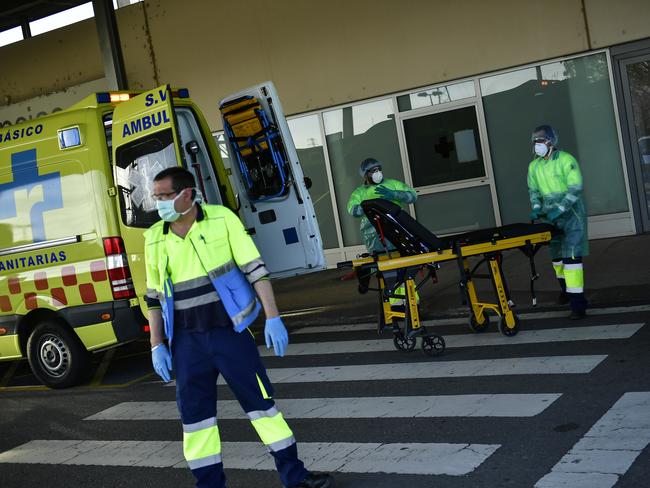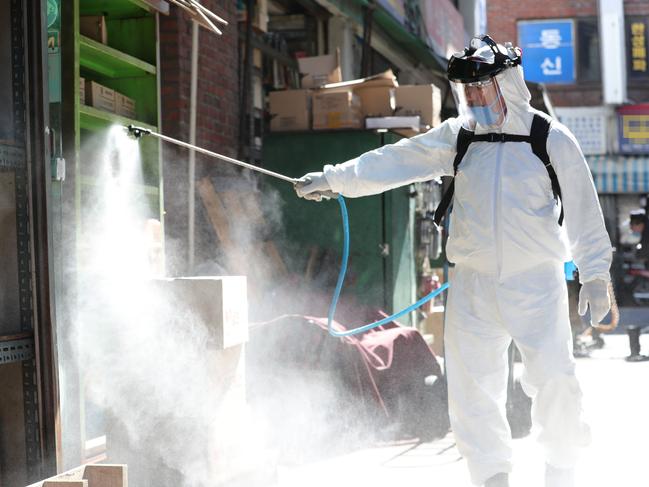Travel insurance amid coronavirus pandemic: How it applies and what to do if you fall sick overseas
Coronavirus has now been labelled a pandemic, and it affects what you can claim on your overseas holiday. Here’s what’s changed and what to do if you fall sick.
Travel
Don't miss out on the headlines from Travel. Followed categories will be added to My News.
- Coronavirus explained: What a pandemic means
- Coronavirus: How Domino’s, Uber Eats will change
- Tom Hanks diagnosed with coronavirus
Australians heading abroad have been warned they could struggle to claim medical expenses through their travel insurer if they are diagnosed with coronavirus.
An audit of 32 product disclosure statements by comparison site Finder found 15 companies specifically exclude claims related to epidemics or pandemics.
These include Budget Direct, 1Cover, Australia Post, Boomers, CoverMore, Fast Cover, Holiday Rescue, iTrek, Online Travel Insurance, Southern Cross Travel Insurance, Virgin Money, Webjet, World2Cover, Worldcare and Zoom.
The World Health Organisation officially labelled the coronavirus a pandemic overnight.
Eight insurers did not directly explain how they would treat the situation including AHM, Allclear, American Express, Medibank, Qantas, RACV, Travel Insurance Direct and Travel Insurance Saver.
Nine included some cover, including Columbus Direct, ING Travel Insurance, Insure4Less, InsureandGo, Tick Travel Insurance, Tilda, Travel Insuranz, Travel with Jane and Travel With Kit.
However, the situation is fluid, and customers have been told to check coronavirus-specfic alerts issued by their travel insurer.

Australia also has Reciprocal Health Care Agreements with 11 countries, including Belgium, Italy, Finland, Malta, the Netherlands, New Zealand, Norway, the Republic of Ireland, Slovenia, Sweden and the UK.
You must require essential care that cannot wait until you return to Australia in order to access healthcare under the agreements.
You’ll also need to show a hospital or doctor a valid Australian passport or another passport that shows permanent Australian residency, and a current Medicare card.
Depending on the country, Australians can access hospital care, dental care, and GPs at a subsidised cost. A co-payment is generally required.
Finder conducted the analysis prior to the World Health Organisation’s pandemic declaration, but the company’s insurance specialist Sophie Walsh told News Corp little would have changed.
“Many travel insurers lump epidemic, pandemic, and outbreaks into the same category, and is has been referred to as an epidemic for the past few weeks,” Ms Walsh said.
The review looked at travel insurers’ product disclosure statements to establish how they treated events related to a outbreaks, epidemics and pandemics.
But Ms Walsh said it was essential to check an insurer’s website for any specific coronavirus alerts.
She said some companies had announced they would not cover coronavirus-related claims if a policy was purchased in late January. Others had stated no cover would be provided regardless of when the policy was purchased.
Some insurers might not provide cover for travel disruptions such as flight cancellations if they were caused by the coronavirus, but may cover some medical expenses.
Ms Walsh said if you were still unclear to call your travel insurer and ask directly what their policy was amid the coronavirus pandemic.
Ms Walsh said that if you do fall ill, the 24/7 emergency hotlines of travel insurers should be your first port of call.
“They’ll help point you in the right direction and let you know whether or not you should be going to hospital or a GP” she said.
She said contacting your travel insurer before seeking medical care meant they could organise payment of your treatment.
However, if you made payment, Ms Walsh said to note down what happened leading up to the event, and keep copies of receipts for when you make a claim.
“Keeping tickets is also important, because insurers will look at them to ensure you didn’t travel to any countries that have a ‘do not travel’ ban,” she said.
She said downloading a translation app, such as Google Translate on your phone was useful to have in case of any language barriers when dealing with medical workers.

Canstar money expert Effie Zahos told News Corp travel insurance policies a “minefield”.
“Generally speaking, about half of insurers cover for medical expenses relating to an outbreak, epidemic or pandemic,” she said.
“Cover More is one example where if you booked your holiday before their announcement was made, then you would likely be covered for medical expenses but not any other claims relating to the coronavirus.
“Less than half cover for cancellation expenses.
“When people purchase policies they generally have an option to pay more in case you change your mind.
“A lot of people are stuck now because they will be changing their mind and realising they’re not covered for that part.”
Ms Zahos said if travellers had paid for parts of their trip on credit card, that could act as a back-up.
“You may have insurance there … if you’ve booked a hotel and it shuts down amid the outbreak, then they haven’t delivered a service and you might be able to get some compensation,” she said.
MORE NEWS:
Does hand sanitiser work against virus?
Coronavirus turns global cities into eerie ghost towns
How coronavirus will hurt us the most
Aussies most likely to die from coronavirus
Compare Insurance Director Natalie Ball told News Corp it was essential travellers did their due diligence.
“If you’re unsure about any upcoming travel plans...check your insurer’s fine print to ensure what’s covered under your policy. See if you can postpone any travel dates and invest in refundable, flexible tickets. And always check DFAT’s travel advisories before moving forward,” Ms Ball said.
There have been more than 125,000 cases of coronavirus worldwide, and more than 4600 deaths.


